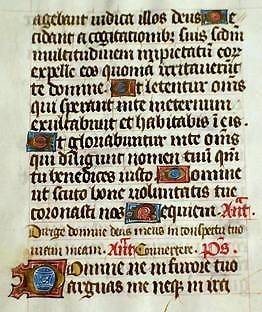
 DON’T PROFESS to have anything more than a rudimentary knowledge of Latin, but even I can apprehend something of its beauty and usefulness, whether from the religious perspective, the historical perspective or any other perspective for that matter. Therefore, I am at a lost to explain why the Latin language engenders such fits of rage and anger in mainstream Catholic “intellectual” circles, whether they include the clergy, educators or “enlightened” laymen.
DON’T PROFESS to have anything more than a rudimentary knowledge of Latin, but even I can apprehend something of its beauty and usefulness, whether from the religious perspective, the historical perspective or any other perspective for that matter. Therefore, I am at a lost to explain why the Latin language engenders such fits of rage and anger in mainstream Catholic “intellectual” circles, whether they include the clergy, educators or “enlightened” laymen.
The most comical expressions of anti-Latin thought emanate from the mouths of young children who inform me in rehearsal that Vatican II said we are supposed to worship in English (admittedly this happens less and less as the years go by). Am I to believe that these 9 year old children have read, discussed and prayed about Sacrosanctum concilium? How did I miss the line in SC that ordered the entire Church, for example the Church in Germany or Brazil, to worship in English?
Unfortunately my avocation of church musician doesn’t allow me to sidestep the Latin vs. vernacular issue any more than a house painter is able to avoid paint. To sing Roman Catholic music is to sing in the Latin tongue. To worship in the Roman Catholic Liturgy is to worship in a way formed by the Latin language (this is true even in the vernacular translation of the modern Roman Rite).
Leaving religion aside for the moment and turning to the more mundane task of education in general, Dorothy Sayers, in her exceptional essay The Lost Tools of Learning, admits that “the best grounding for education is the Latin grammar. I say this, not because Latin is traditional and medieval, but simply because even a rudimentary knowledge of Latin cuts down the labor and pains of learning almost any other subject by at least fifty percent. It is the key to the vocabulary and structure of all the Teutonic languages, as well as to the technical vocabulary of all the sciences and to the literature of the entire Mediterranean civilization, together with all its historical documents.” Anyone who has ever read Sayers would agree that the study of Latin didn’t stunt her intellectual prowess. So why is this tool, as Sayers described it, so despised?
I ask this question because of an article by Deacon Jim Russell that appeared recently at Crisis Magazine, which claimed that the the loss of Latin has had disastrous effects on Roman Catholic sacred music. To be honest, music isn’t the only thing the loss has affected (I think of theology especially), but let’s keep to the subject of music for the moment. Where do we see today the likes of Prudentius, Fortunatus, Ambrose or even Blessed John Henry Cardinal Newman? Now that our society has severed itself from the great tradition of Western Civilization, which is intimately bound to the Latin language, the only lyrics we are left with are catchy little ditties foisted on us from the pen of every musician who feels the need to “express himself.” (I am reminded here of the lyrics from such a “hymn” from my Catholic school days—Great Things Happen when God Mixes with Us, from the Glory and Praise hymnal).
Funnily enough, I am not opposed to the use of vernacular in the Holy Mass or the Divine Office. Neither am I against the true inculturation of the Faith into various local communities. But I am mightily opposed to the ridiculous notion that having cut ourselves free from the moorings of Latin we are now in possession of a better understanding of God or our Faith than anyone before 1965. Such a mentality cheapens the lives of countless men, women and children, ordained and lay, old and young, rich and poor, important and unimportant who lived and died over the last 1500 years to bring the light of Christ to a world in such need of His Love and Mercy. Remember that those same men and women were formed in a time when the Sacred Liturgy was entirely in Latin. Would they have given their lives to Christ if they hadn’t known Him or loved Him? I doubt it. And here we arrive at the crux of the issue. I find that those who are so opposed to the use of Latin in our worship (especially when coupled with ad orientem worship) are generally opposed to the traditional belief that worship is about God, and instead desire to circle their wagons (literally) and turn their thoughts in on themselves as an assembly. Worship becomes group therapy and entertainment rather than an encounter with the living God.
It is time that we leave behind this “hermaneutic of discontinuity” and awake from our religious amnesia and embrace our Faith in its fullness. It is time that we break from the shackles that would have us believe that the Church began in the 1960s. It is time to remember that our heavenly family has a history encompassing 2000 years of the greatest saints, poets, lovers, fighters, evangelizers and men and women who had their eyes set on the heavenly city, the New and Eternal Jerusalem. Recovery of Latin alone won’t do this, but it would symbolically and intellectually open a breach in what seems to be an impregnable wall that keeps us from seeing the hand of God alive in His Church in every age.

